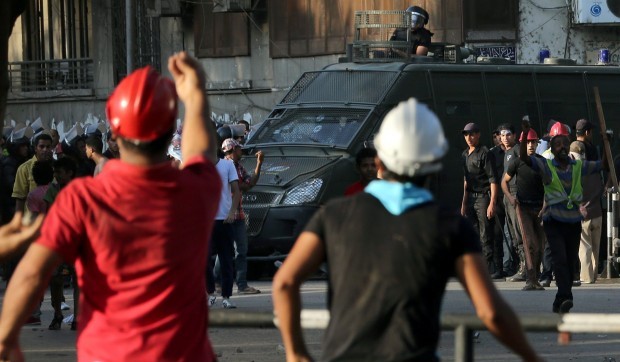
Supporters of ousted president Mohamed Morsi clash with police near the US embassy in Cairo, Egypt on July 22, 2013. (EPA)
London, Asharq Al-Awsat—Following yesterday’s call by Egyptian army chief Gen. Abdel-Fattah El-Sisi for mass demonstrations against “violence” and “terrorism” on Friday, fugitive Muslim Brotherhood general guide Mohamed Badie has called for pro-Mursi supporters to carry out a counter-protest on the same day.
On Wednesday, Sisi called on Egyptians “to go down to the streets to give the army the mandate to take firm action against violence and terrorism.”
In response to this, Badie, Egypt’s top Brotherhood official, issued a statement earlier today calling for the Egyptian people to “turn out, to announce you stand for freedom and legitimacy and against the bloody coup.”
Badie, who is wanted by the Egyptian authorities on charges of inciting violence, remains defiant more than two weeks following Mursi’s ouster. Mursi supporters have conducted a round-the-clock sit-in outside Cairo’s Rabaa Al-Adawiya mosque, pledging to remain on the streets until the Islamist president is reinstated.
The Muslim Brotherhood described Sisi’s call for protests against violence as a call for civil war.
“The [Muslim Brotherhood] coalition asserts that the threats made by Sisi, leader of the military coup, are nothing short of a full call for civil war and a warning that massacres—widespread massacres—will be held under a false cover of popular support,” said Brotherhood spokesman Gehad El-Haddad at a news conference yesterday.
Another Brotherhood spokesman, Mohamed El-Beltagy, said Sisi had installed himself as de facto leader of Egypt and had called for these mass demonstrations in order to shore up his position.
He said, “Abdel-Fattah El-Sisi, who claims in his first statement that he had to remove the elected president in a military coup to escape a national conflict and civil war, is now calling for a civil war himself to protect his military coup.”
“He is proving that he is the actual ruler of the country and that the president, his vice president and the government do not hold any power,” he added.
Egypt’s Tamarod (Rebellion) movement, which led the protests that ultimately resulted in Mursi’s ouster, have backed Sisi’s call.
Tamarod leader Mahmoud Bard told Reuters: “We call on the people to take to the streets on Friday to support their armed forces, which we support and are happy for it to play its role in confronting the violence and terrorism practiced by the Muslim Brotherhood.”
The Association of Muslim Scholars, led by top Sunni cleric Sheikh Yusuf Al-Qaradawi, issued a fatwa on Wednesday “prohibiting [Egyptians from] responding to any call leading to civil war, or covering up [the army’s actions] of violence against any party, or inciting sedition.”
Egypt’s top Sunni religious authority, Al-Azhar, had been seeking to foster national reconciliation before Sisi and Badie’s calls for demonstrations.
Qaradawi, who is based in Doha, Qatar, urged “all Egyptians—people, parties, army and police—to preserve their country’s security and prevent anything that could lead to a civil war in which all sides will be losers.”
In light of the calls for protests and counter-protests on Friday, the US has halted a delivery of four F-16 fighter jets to Egypt in the strongest signal of Washington’s concern regarding the actions of the armed forces so far.
“Given the current situation in Egypt, we do not believe it is appropriate to move forward at this time with the delivery of F-16’s,” said chief Pentagon spokesman George Little on Wednesday, hours after Sisi’s calls for mass demonstrations.
Although the F-16 delivery has been delayed, Washington is still set to donate equipment worth a reported USD 1.3 billion to Egypt.
Speaking at a press conference on Wednesday, Little confirmed that US Defense Secretary Chuck Hagel had discussed Sisi’s call for mass demonstrations in support of the military with the Egyptian army chief on Friday. He refused to comment on whether the suspension of the F-16 shipment was intended to send a message to Sisi to keep the military out of politics.
Violence in the country is on the rise as a result of instability following Mursi’s ouster. More than 100 people have been killed since Egypt’s first Islamist president was deposed by the military on July 3, with some estimates putting the death toll at more than 200.
Security in Egypt’s Sinai Peninsula is deteriorating, with periodic clashes between the security forces and suspected Islamist militants. In the latest violence, a car bomb was detonated near a police training camp in the northern Sinai city of El-Arish on Wednesday, killing three militants. Egyptian officials suggested that the car may have exploded prematurely. On the same day, suspected Islamist militants attacked security checkpoints in El-Arish and the nearby town of Sheikh Zuweyid, resulting in the death of a civilian and a soldier.
